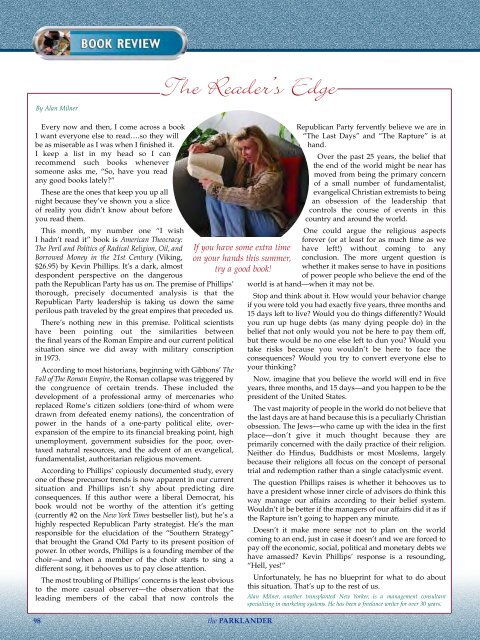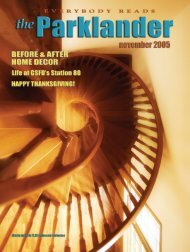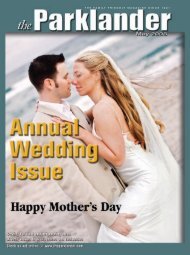June 2006 - The Parklander Magazine
June 2006 - The Parklander Magazine
June 2006 - The Parklander Magazine
- No tags were found...
You also want an ePaper? Increase the reach of your titles
YUMPU automatically turns print PDFs into web optimized ePapers that Google loves.
<strong>The</strong> Reader’s EdgeBy Alan MilnerEvery now and then, I come across a bookI want everyone else to read….so they willbe as miserable as I was when I finished it.I keep a list in my head so I canrecommend such books wheneversomeone asks me, “So, have you readany good books lately?”<strong>The</strong>se are the ones that keep you up allnight because they’ve shown you a sliceof reality you didn’t know about beforeyou read them.This month, my number one “I wishI hadn’t read it” book is American <strong>The</strong>ocracy:<strong>The</strong> Peril and Politics of Radical Religion, Oil, andBorrowed Money in the 21st Century (Viking,$26.95) by Kevin Phillips. It’s a dark, almostdespondent perspective on the dangerouspath the Republican Party has us on. <strong>The</strong> premise of Phillips’thorough, precisely documented analysis is that theRepublican Party leadership is taking us down the sameperilous path traveled by the great empires that preceded us.<strong>The</strong>re’s nothing new in this premise. Political scientistshave been pointing out the similarities betweenthe final years of the Roman Empire and our current politicalsituation since we did away with military conscriptionin 1973.According to most historians, beginning with Gibbons’ <strong>The</strong>Fall of <strong>The</strong> Roman Empire, the Roman collapse was triggered bythe congruence of certain trends. <strong>The</strong>se included thedevelopment of a professional army of mercenaries whoreplaced Rome’s citizen soldiers (one-third of whom weredrawn from defeated enemy nations), the concentration ofpower in the hands of a one-party political elite, overexpansionof the empire to its financial breaking point, highunemployment, government subsidies for the poor, overtaxednatural resources, and the advent of an evangelical,fundamentalist, authoritarian religious movement.According to Phillips’ copiously documented study, everyone of these precursor trends is now apparent in our currentsituation and Phillips isn’t shy about predicting direconsequences. If this author were a liberal Democrat, hisbook would not be worthy of the attention it’s getting(currently #2 on the New York Times bestseller list), but he’s ahighly respected Republican Party strategist. He’s the manresponsible for the elucidation of the “Southern Strategy”that brought the Grand Old Party to its present position ofpower. In other words, Phillips is a founding member of thechoir—and when a member of the choir starts to sing adifferent song, it behooves us to pay close attention.<strong>The</strong> most troubling of Phillips’ concerns is the least obviousto the more casual observer—the observation that theleading members of the cabal that now controls theIf you have some extra timeon your hands this summer,try a good book!Republican Party fervently believe we are in“<strong>The</strong> Last Days” and “<strong>The</strong> Rapture” is athand.Over the past 25 years, the belief thatthe end of the world might be near hasmoved from being the primary concernof a small number of fundamentalist,evangelical Christian extremists to beingan obsession of the leadership thatcontrols the course of events in thiscountry and around the world.One could argue the religious aspectsforever (or at least for as much time as wehave left!) without coming to anyconclusion. <strong>The</strong> more urgent question iswhether it makes sense to have in positionsof power people who believe the end of theworld is at hand—when it may not be.Stop and think about it. How would your behavior changeif you were told you had exactly five years, three months and15 days left to live? Would you do things differently? Wouldyou run up huge debts (as many dying people do) in thebelief that not only would you not be here to pay them off,but there would be no one else left to dun you? Would youtake risks because you wouldn’t be here to face theconsequences? Would you try to convert everyone else toyour thinking?Now, imagine that you believe the world will end in fiveyears, three months, and 15 days—and you happen to be thepresident of the United States.<strong>The</strong> vast majority of people in the world do not believe thatthe last days are at hand because this is a peculiarly Christianobsession. <strong>The</strong> Jews—who came up with the idea in the firstplace—don’t give it much thought because they areprimarily concerned with the daily practice of their religion.Neither do Hindus, Buddhists or most Moslems, largelybecause their religions all focus on the concept of personaltrial and redemption rather than a single cataclysmic event.<strong>The</strong> question Phillips raises is whether it behooves us tohave a president whose inner circle of advisors do think thisway manage our affairs according to their belief system.Wouldn’t it be better if the managers of our affairs did it as ifthe Rapture isn’t going to happen any minute.Doesn’t it make more sense not to plan on the worldcoming to an end, just in case it doesn’t and we are forced topay off the economic, social, political and monetary debts wehave amassed? Kevin Phillips’ response is a resounding,“Hell, yes!”Unfortunately, he has no blueprint for what to do aboutthis situation. That’s up to the rest of us.Alan Milner, another transplanted New Yorker, is a management consultantspecializing in marketing systems. He has been a freelance writer for over 30 years.98the PARKLANDER
















